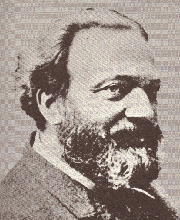Richard Avenarius facts for kids
Quick facts for kids
Richard Avenarius
|
|
|---|---|
 |
|
| Born | 19 November 1843 |
| Died | 18 August 1896 (aged 52) |
| Alma mater | University of Zurich University of Berlin Leipzig University |
| Era | 19th-century philosophy |
| Region | Western philosophy |
| School | Empirio-criticism (Critical positivism) |
| Institutions | Leipzig University University of Zurich |
|
Main interests
|
Empirical knowledge, philosophy of science |
|
Notable ideas
|
Empirical criticism |
|
Influenced
|
|
Richard Ludwig Heinrich Avenarius (born November 19, 1843 – died August 18, 1896) was an important German-Swiss philosopher. He developed a special way of thinking called "empirical criticism" or empirio-criticism. This idea focuses on understanding things based only on what we can experience.
Life and Education
Richard Avenarius was born in Paris in 1843. He went to school in Leipzig, Germany. Later, he studied at several famous universities. These included the University of Zurich, the University of Berlin, and the Leipzig University.
In 1868, he earned his PhD from the University of Leipzig. His main paper was about another philosopher named Baruch Spinoza. Avenarius started teaching at Leipzig in 1876. A year later, he became a professor at the University of Zurich in Switzerland. He continued to teach there until he passed away in Zurich in 1896.
His Ideas and Works
Avenarius believed that scientific philosophy should focus on describing our experiences very clearly. He thought that philosophy should not include ideas that are hard to prove or are based on beliefs about matter alone. He wanted to keep philosophy focused on what we can observe and understand directly.
His ideas were quite different from some other thinkers. For example, he disagreed with the materialist views of Carl Vogt. This led to a famous disagreement with Vladimir Lenin, who wrote a book criticizing Avenarius's ideas.
Avenarius wrote two very important books. One was called Kritik der reinen Erfahrung, which means Critique of Pure Experience. He published this between 1888 and 1890. His other major work was Der menschliche Weltbegriff, or The Human Concept of the World, published in 1891. These books were known for being quite complex.
His ideas had an impact on other philosophers. Some of these included Ernst Mach and William James. He also taught Anatoly Lunacharsky and influenced thinkers like Alexander Bogdanov.
His Family Connections
Richard Avenarius was the second son of Eduard Avenarius, a German publisher. His mother was Cäcilie Geyer. Cäcilie's father was an actor and painter named Ludwig Geyer. This made her the step-sister of the famous composer Richard Wagner. Some people even thought Ludwig Geyer might have been Wagner's biological father.
Richard Avenarius's brother was Ferdinand Avenarius. Ferdinand was also well-known. He led a cultural group called the Dürerbund and helped start a movement to reform culture in Germany. Interestingly, Richard Wagner was Richard Avenarius's godfather.
See also
 In Spanish: Richard Avenarius para niños
In Spanish: Richard Avenarius para niños
 | Aurelia Browder |
 | Nannie Helen Burroughs |
 | Michelle Alexander |

